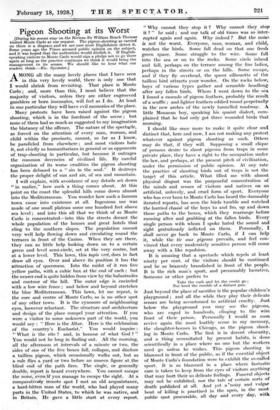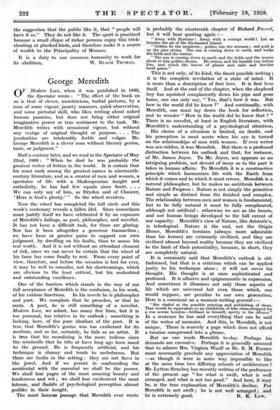Pigeon Shooting at its Worst
(During his recent stay on the Riviera Sir William Beach Thomas visited Monte Carlo at our request. The pigeon-shooting as carried on there is a disgrace and we are sure most Englishmen detest it. Some years ago the Tiniee aroused public opinion on the subject, and it was hoped that the authorities would abolish it. If English- speaking visitors to Monte Carlo would sign a pledge not to go there again as loiig as the practice continues we think it would bring the management to its senses. We should like to hear what our readers think.—ED. Spectator.] A MONG all the many, lovely places that I have seen in this very lovely world, there is only one that I would shrink from revisiting. That place is Monte Carlo ; and, more than this, I must believe that the majority of visitors, unless they are either engrooyed gamblers or born insensates, will feel as I do. At least in one particular they will have evil memories of the place.
Many protests have been raised against the pigeon shooting, which is in the forefront of the scene ; but none of them had so much as suggested to my imagination the blatancy of the offence. The nature of the spectacle, as forced on the attention of every man, woman, and child within the precincts, cannot, so far as I know, be paralleled from elsewhere ; and most visitors hate it, not chiefly as humanitarians, in general or as opponents of trap-shooting in particular, but because it outrages the common decencies of civilized life. By careful organization of its worse crudities the pigeon shooting has been debased to a " sin in the soul." It destroys the proper delight of sun and air, of sea and mountain.
I will explain, with avoidance of any details set down " in malice," how such a thing comes about. At this point on the coast the splendid hills come down almost into the Mediterranean. You wonder how such a famous town came into existence at all. Ingenious use was made of one small plateau some one hundred feet above sea level ; and into this all that we think of as Monte Carlo is concentrated—into this the streets decant the whole population of the houses and great hotels that cling to the southern slopes. The population cannot Very well help flowing down and circulating round the terraces in front of the Casino. When they are there, they can as little help looking down on to a certain green and level semi-circle, set at the very centre, but at a lower level. This lawn, this tapis vert, does in fact draw all eyes. Over and above its position it has the attraction of queerness. Into the • midst of it run five yellow paths, with a cubic box at the end of each ; but the nearer end is quite hidden from view by the balustrades and contour of the hill. The outer edge is 'encircled with a low wire ferice ; and below and beyond stretehes the blue Mediterranean. This lawn, let me repeat, is the core and centre of Monte Carlo,- as is no other spot of any other town. It is the cynosure of neighbouring eyes, however reluctant. The structure and architecture and design of the place compel your attention. If you were a visitor to some unknown part of the world, you would say : " Here is the Altar. Here is the celebratkin of the country's Eucharist." You would inquire : " What is the rite ?, and, in honour of what God ? " You would not be long in finding out. All the morning, all the afternoon at intervals of ,a minute or two, the sides of one of the five boxes fall, collapse, and disclose a tailless pigeon, which occasionally walks out, but as a rule flies a yard or two before an unseen figure at,the blind end- of the path fires. The single, or generally double, report is heard everywhere. You, cannot' escape the noise, ' even if you manage to escape the sight. At a comparatively remote spot I met an old acquaintance, a hard-bitten man of the world, who had played many parts in, the United States, to which he was native, and in Britain. He gave a little start at every report. " Why cannot they stop it ? Why cannot they stop it ? " he said ; and our talk of old times was so inter- rupted again and again. Why indeed ? But the noise is not the worst. Everyone, man, woman, and child, watches the birds. Some fall dead on that one fresh green space. Some struggle to the wire. Some fall into the sea or on to the rocks. Some circle inland and fall, perhaps on the terrace among the fine ladies, perhaps in the streets or on the hills. Some escape, and if they fly overhead, the queer silhouette of the tailless bird attracts your wonder. On the rocks below, boys of various types gather and scramble headlong after any fallen birds. Where I went down to the sea I found a cascade of pigeon feathers, probably the result of a scuffle ; and lighter feathers eddied round perpetually in the new arches of the newly tunnelled roadway. A little Monacan boy, speaking his quaint dialect, com- plained that he had only got three wounded birds that morning.
I should like once more to make it quite clear and distinct that, here and now, I am not making any protest whatever against pigeon shooting as such. Others may do that, if they will. Supposing a small clique of persons desire to shoot pigeons from traps in some private place, they have a right to the occupation under the law, and perhaps, at the present pitch of civilization, under the permission of public opinion. At any rate the practice of shooting birds out of traps is not the target of this article. What filled me with almost physical disgust was the purposeful concentration of the minds and senses of visitors and natives on an artificial, unlovely, and cruel form of sport. Everyone who has ever been to Monte Carlo has heard the damnably iterated reports, has seen the birds tumble and watched the hurried chasse of the boys to and fro, up and down those paths to the boxes, which they rearrange before running after and grabbing at the fallen birds. Every single person with whom I spoke hated the sound and sight gratuitously inflicted on them. Personally, I shall never go back to Monte Carlo, if I can help it, while the lir aux pigeons prevails, and feel con- vinced that every moderately sensitive person will come away with a like repulsion.
It is amazing that a spectacle which repels at least ninety per cent. of the visitors should be continued and be so brazenly brandished in front of the people. It is the rich man's sport, and presumably lucrative. Someone or other prefers to
Take the cash and let the credit go ; Nor heed the rumble of a distant gun.
Just beyond the place of sacrifice is the popular children's playground ; and all the while they play their delicate senses are being accustomed to artificial cruelty. Just below the playground you may see the pigeons, who are caged in hundreds, clinging to the wire front of their prison. Personally I would as soon revive again the most loathly scene in my memory, the slaughter-houses in Chicago, as the pigeon shoot- ing in Monte Carlo. The first is in decent obscurity, and a thing necessitated by present habits, is done scientifically in a place where no one but the workers need go unless he wishes. This pigeon shooting is blazoned in front of the public, as if the essential object of Monte Carlo's foundation were to exhibit the so-called sport:' It is so blazoned in a place where fantastic care is taken' to keep from the eyes of visitors anything that may hurt their so delicate feelings. Funeral objects may not be exhibited, nor the talc of certain sorts of death published at all. And yet a •noisy and vulgar bout of killing is practised in the open, in the most public spot procurable, all day and every day, with the suggestion that the public like it, that " people will have it so." They do not like it. The sport is practised because a small clique of richer persons enjoy this trick- shoOting at phicked birds, and therefore make it a source of wealth to the Principality of Monaco.
It is a duty to our common humanity to work for







































 Previous page
Previous page